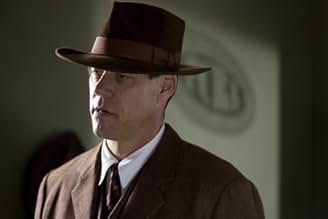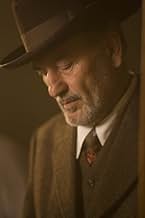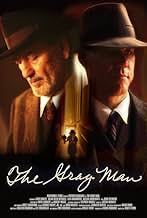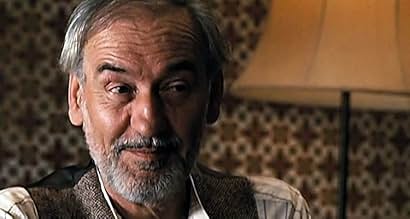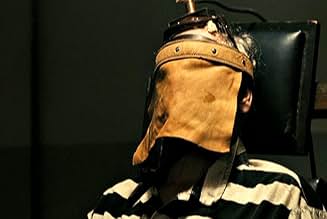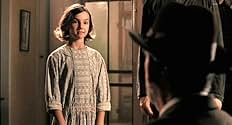IMDb RATING
5.9/10
1.9K
YOUR RATING
Obsessive manhunt to identify and capture a despicable serial killer.Obsessive manhunt to identify and capture a despicable serial killer.Obsessive manhunt to identify and capture a despicable serial killer.
- Director
- Writers
- Stars
- Awards
- 1 nomination total
- Director
- Writers
- All cast & crew
- Production, box office & more at IMDbPro
Featured reviews
10canenas
Period detective movie with outstanding craft and style. Albert Fish was one of the first serial killers to live and die in America in the early part of the last century. Although he committed crimes beyond comprehension, his tale was relatively unknown, until now.
The story is based on a solid script with emphasis on plot and character rather than gore and violence. This is not to say that this is a family movie. It just avoids the temptation of gratuitous violence and instead focuses on the human dimensions of the protagonists. The story follows Detective King on his obsessive manhunt as he assembles the clues to establish the killer's identity. At the same time, it attempts to read into the mind of the killer, even portraying a bit of his human side.
There are great performances by Patrick Bauchau (Fish) and Jack Conley (Detective King). In addition, the stars of the movie was the stellar photography by Dave Rudd, and the production design by Jennifer Gentile. Given the modest budget, the film convincingly captures the feel of New York in the 1920s and 1930s. The art department went to great lengths to recreate the slightest period details. And yes, it was shot on actual 35 mm film, in unsurpassed color. A visual feast.
The story is based on a solid script with emphasis on plot and character rather than gore and violence. This is not to say that this is a family movie. It just avoids the temptation of gratuitous violence and instead focuses on the human dimensions of the protagonists. The story follows Detective King on his obsessive manhunt as he assembles the clues to establish the killer's identity. At the same time, it attempts to read into the mind of the killer, even portraying a bit of his human side.
There are great performances by Patrick Bauchau (Fish) and Jack Conley (Detective King). In addition, the stars of the movie was the stellar photography by Dave Rudd, and the production design by Jennifer Gentile. Given the modest budget, the film convincingly captures the feel of New York in the 1920s and 1930s. The art department went to great lengths to recreate the slightest period details. And yes, it was shot on actual 35 mm film, in unsurpassed color. A visual feast.
"The Gray Man" is an important addition to the horror genre. Director Scott Flynn chose to tell the story of Albert Fish, a serial murderer who is believed to have murdered and cannibalized several young children in the late 1920s and early 1930s in the environs of New York City. Fish worked as a handyman and painter in most of the neighborhoods he lived in, and was seen for the most part as a relatively inoffensive and grandfatherly individual by many people. In reality, he is said to have possessed a raging sociopathic pattern that knew its roots in the harsh treatment he received in state orphanages run by religious fanatics in the upper boroughs of the city. Flynn's film gives the viewer a slight background of Fish's character so that even the most offended audience member can understand Fish's motivation. The man remains genuinely creepy in depiction, however, simply due to the deep horror of life that true degeneracy, or "evil", if you must, rarely has a loud "telegraph". Albert Fish is scary because he looks like the earnest, hard working sort of character who you'd hire to repair your furnace.
"The Gray Man" is also a significant work in horror, because it puts to rest the idea that a grisly tale must rely upon grisly depiction in order to unsettle the viewer. Director Flynn has wisely chosen not to graphically re-create the murders, and does not bother with lurid presentations of children being dissected or disposed of as meat. It might seem ridiculous that I would even have to point this out, but anyone who knows contemporary horror understands how little credit all too many Gothic film makers lend the imagination of their public anymore. I don't want to belabor the point, suffice it to say that "The Gray Man" puts films like "Saw" and "Hostel" to shame. Very few things in this life are as terrifying as a child murderer, Flynn and his cast put this true story across without much reliance on the sensational. Why, they even rely on a few little tricks like "atmosphere" here. Imagine that.
Leading the cast is veteran actor Patrick Bauchau, who brings the character of Albert Fish himself a terrifying but not entirely unlikeable quality. His work in this film is a delicately balanced affair that is more effective than that of Anthony Hopkins in "The Silence of the Lambs". Hopkin's performance in that work is outstanding, of course, but it is relatively melodramatic and over- the- top compared to the craft and restraint Bauchau offers here.. Following Bauchau up as the intrepid Missing Persons investigator Will King is Jack Conley, whose world weary demeanor I found very welcome in this age of celluloid depictions of lantern jawed law enforcement officials who always know what to do. Conley's King is a man unsure in his surety, a gumshoe who's likable for the same reasons we like Jake Gittes in "Chinatown" and Sam Spade in "The Maltese Falcon". He's sort of an anti-bureaucratic bureaucrat.
The other supporting cast members are quite good, most notably the perpetually bemused children of Albert Fish, Gertrude and Albert Jr., who know him alternately as both solid family man and abusive personality. The roles are handled by Mollie Milligan and Silas Mitchell. Jillian Armaneni is powerful as the mother of Grace Budd, the victim of Fish whose disappearance finally put investigators on his trail, and Lexi Ainsworth is very fine as Grace herself. Ben Hall holds his own as Grace's brother Albert, and character actor Bill Flynn has an appearance as the notorious Dr. Frederick Wertham (yes, he of the controversial 1950s anti- comic book crusade) who was a defense witness at the Fish trial as Fish and his crew pleaded insanity.
As for accuracy, who knows? So much has been written about the case that, now, seventy five years after the events themselves, it's even more difficult to separate the folklore from the reality of the moment. Albert Fish has entered that realm of real-life bogeymen with a distinction known by few, so the scuttlebutt will continue to blossom. Be that as it may, "The Gray Man" is a finely crafted, ambitious and riveting horror film, one of the few in the contemporary samples from the genre that is worthy of the time it takes to view it.
"The Gray Man" is also a significant work in horror, because it puts to rest the idea that a grisly tale must rely upon grisly depiction in order to unsettle the viewer. Director Flynn has wisely chosen not to graphically re-create the murders, and does not bother with lurid presentations of children being dissected or disposed of as meat. It might seem ridiculous that I would even have to point this out, but anyone who knows contemporary horror understands how little credit all too many Gothic film makers lend the imagination of their public anymore. I don't want to belabor the point, suffice it to say that "The Gray Man" puts films like "Saw" and "Hostel" to shame. Very few things in this life are as terrifying as a child murderer, Flynn and his cast put this true story across without much reliance on the sensational. Why, they even rely on a few little tricks like "atmosphere" here. Imagine that.
Leading the cast is veteran actor Patrick Bauchau, who brings the character of Albert Fish himself a terrifying but not entirely unlikeable quality. His work in this film is a delicately balanced affair that is more effective than that of Anthony Hopkins in "The Silence of the Lambs". Hopkin's performance in that work is outstanding, of course, but it is relatively melodramatic and over- the- top compared to the craft and restraint Bauchau offers here.. Following Bauchau up as the intrepid Missing Persons investigator Will King is Jack Conley, whose world weary demeanor I found very welcome in this age of celluloid depictions of lantern jawed law enforcement officials who always know what to do. Conley's King is a man unsure in his surety, a gumshoe who's likable for the same reasons we like Jake Gittes in "Chinatown" and Sam Spade in "The Maltese Falcon". He's sort of an anti-bureaucratic bureaucrat.
The other supporting cast members are quite good, most notably the perpetually bemused children of Albert Fish, Gertrude and Albert Jr., who know him alternately as both solid family man and abusive personality. The roles are handled by Mollie Milligan and Silas Mitchell. Jillian Armaneni is powerful as the mother of Grace Budd, the victim of Fish whose disappearance finally put investigators on his trail, and Lexi Ainsworth is very fine as Grace herself. Ben Hall holds his own as Grace's brother Albert, and character actor Bill Flynn has an appearance as the notorious Dr. Frederick Wertham (yes, he of the controversial 1950s anti- comic book crusade) who was a defense witness at the Fish trial as Fish and his crew pleaded insanity.
As for accuracy, who knows? So much has been written about the case that, now, seventy five years after the events themselves, it's even more difficult to separate the folklore from the reality of the moment. Albert Fish has entered that realm of real-life bogeymen with a distinction known by few, so the scuttlebutt will continue to blossom. Be that as it may, "The Gray Man" is a finely crafted, ambitious and riveting horror film, one of the few in the contemporary samples from the genre that is worthy of the time it takes to view it.
This movie was not exactly what I was expecting. I thought it would be a more focused character study of Albert Fish - the kidnapper/murderer/cannibalizer of young children in New York City in the late 1920's-early 1930's. That angle isn't lost here. The movie opens with a depiction of Fish as an abused child in an orphanage, giving some insight into where he developed his sado-masochistic tendencies, but really this movie focused more on the police investigation into one case - the kidnapping, murder and cannibalizing of 10 year old Grace Budd. The Budd case was the one that eventually brought Fish down, and the movie really revolved around Police Detective William King, who headed the investigation into Budd's disappearance.
Fish seems to have been one of the earliest serial killers to prey on young children. The cannibal angle makes the case even more sensational. The movie, thankfully, isn't very graphic, although the details of exactly what was done to young Grace are talked about but not depicted. What we hear is very disturbing. As far as the Budd case is concerned, the movie seems to be a pretty accurate depiction of real events, but really the Budd case is the only one looked at in any detail, even though there were several other child killings that Fish was responsible for.
Patrick Bauchau was pretty convincing as Fish. He captured the part well - the guy was someone we would all think of as crazy, and yet he was sane enough to plan things out pretty methodically. And in a lot of respects he seemed pretty normal and trustworthy - making him even more frightening. Bachau did well. I wasn't entirely taken with Jack Conley as Det. King, and I found the depiction of Grace's mother (Jillian Armanante) to be strange. She was portrayed almost as being more interested in publicity than in her daughter. That may be true (everything else in this seems pretty accurate based on what I've read so I don't know why they writers would make that upon) but it still seems pretty strange to me.
Really, this provides a glimpse into the mind and one crime of a notorious serial killer. A little more depth and insight would have been necessary to make this a truly good movie. (6/10)
Fish seems to have been one of the earliest serial killers to prey on young children. The cannibal angle makes the case even more sensational. The movie, thankfully, isn't very graphic, although the details of exactly what was done to young Grace are talked about but not depicted. What we hear is very disturbing. As far as the Budd case is concerned, the movie seems to be a pretty accurate depiction of real events, but really the Budd case is the only one looked at in any detail, even though there were several other child killings that Fish was responsible for.
Patrick Bauchau was pretty convincing as Fish. He captured the part well - the guy was someone we would all think of as crazy, and yet he was sane enough to plan things out pretty methodically. And in a lot of respects he seemed pretty normal and trustworthy - making him even more frightening. Bachau did well. I wasn't entirely taken with Jack Conley as Det. King, and I found the depiction of Grace's mother (Jillian Armanante) to be strange. She was portrayed almost as being more interested in publicity than in her daughter. That may be true (everything else in this seems pretty accurate based on what I've read so I don't know why they writers would make that upon) but it still seems pretty strange to me.
Really, this provides a glimpse into the mind and one crime of a notorious serial killer. A little more depth and insight would have been necessary to make this a truly good movie. (6/10)
This is a very well made biography of the 1920-30's serial killer Albert Fish. I thought the set designers did a fabulous job with the period rooming houses, abandoned farms, and even the detectives police station. This is not a glossy MGM or Warner Brothers expensive film production about a fictionalized serial killer. Instead the director, Scott L. Flynn, developed the story line to provide us his film's audience with what it must have been like to live in the 1920-30's with a deranged child molester and serial killer on the loose.
The film maintains a historical value to it by outlining the known crimes and murders committed by Albert Fish without glorifying his crimes with any sexual deviancy nor with much violence and/or excessive blood letting since Albert Fish was known to be a cannibal.
It is easy to focus on the cat and mouse game between the serial killer Albert Fish (Patrick Bauchau) and the lead Detective Will King (Jack Conley) as Albert Fish seems to be unaware that he is being investigated by lead Detective Will King.
As stated earlier this is not a costly production as with (1991) The Silence of the Lambs, or (2007) Zodiac, but what the film The Gray Man does deliver is a first rate biography of the 1920-30's pedophile and serial killer Albert Fish.
I give the film a well deserved 7 out of 10 IMDb rating.
The film maintains a historical value to it by outlining the known crimes and murders committed by Albert Fish without glorifying his crimes with any sexual deviancy nor with much violence and/or excessive blood letting since Albert Fish was known to be a cannibal.
It is easy to focus on the cat and mouse game between the serial killer Albert Fish (Patrick Bauchau) and the lead Detective Will King (Jack Conley) as Albert Fish seems to be unaware that he is being investigated by lead Detective Will King.
As stated earlier this is not a costly production as with (1991) The Silence of the Lambs, or (2007) Zodiac, but what the film The Gray Man does deliver is a first rate biography of the 1920-30's pedophile and serial killer Albert Fish.
I give the film a well deserved 7 out of 10 IMDb rating.
Considering that this film was supposed to tell the story about one of the most bizarre serial killers in history, it's absolutely amazing that the end result we get served is this tedious muck. Something is definitely wrong when you realize that the film you are watching easily can be labeled " a film for the whole family", a film the Hallmark channel would "proudly present." Instead of a thoroughly deep-dive into Mr. Fish's murky psyche, a proper probing into the mechanizations that drove this deranged specimen of a man, a both tell and show with the slaughter and cannibalizing of Grace Budd, what you get is a badly acted detective-story ( with film-noiresque monologue ), a lead that don't remotely look like Albert Fish, and a misplaced focus on the detective in charge. The gore is of course non-existent, and while this "tell, don't show" approach work excellently in films like The Texas Chainsaw Massacre and Dahmer, here it is sorely missed. Inexcusable. Not to mention that certain liberties is being taken in regards to what really happened.
Bottom line; if you want a scary film for the kiddies ( age 3-12 ), go for this one!! On the other hand, if you want a properly nasty horror-film about good old Albert, you better keep your fingers crossed for a director that truly have the courage to handle this dark material the way it deserves! Hopefully soon one will come along......
Bottom line; if you want a scary film for the kiddies ( age 3-12 ), go for this one!! On the other hand, if you want a properly nasty horror-film about good old Albert, you better keep your fingers crossed for a director that truly have the courage to handle this dark material the way it deserves! Hopefully soon one will come along......
Did you know
- TriviaGrace Budd was 10 years old when Albert Fish murdered her. Lexi Ainsworth was 15 at the time of filming.
- GoofsThe house that Albert took Grace to is architecturally an early 1930s house. It would have been too new for it to have been that decrepit as well as abandoned.
- How long is The Gray Man?Powered by Alexa
Details
- Release date
- Country of origin
- Language
- Also known as
- Wisteria: The Story of Albert Fish
- Filming locations
- Production company
- See more company credits at IMDbPro
Box office
- Budget
- $1,300,000 (estimated)
- Runtime
- 1h 37m(97 min)
- Color
Contribute to this page
Suggest an edit or add missing content


